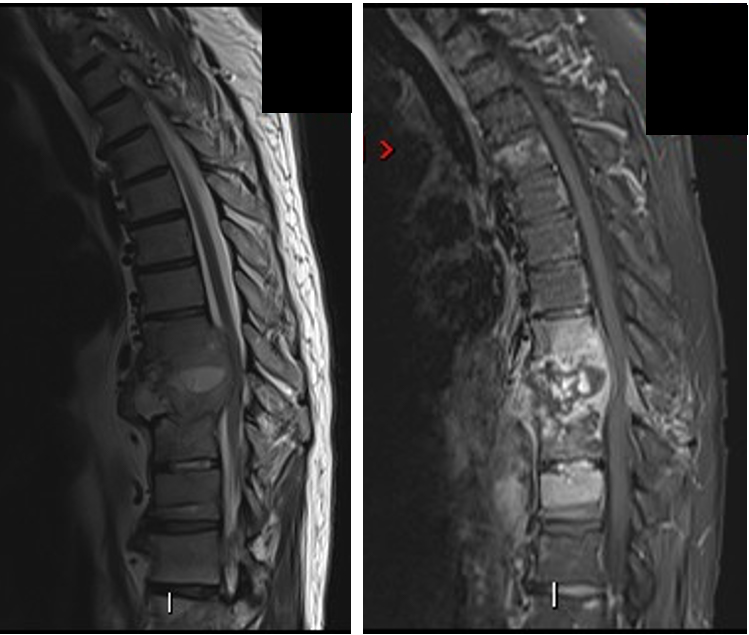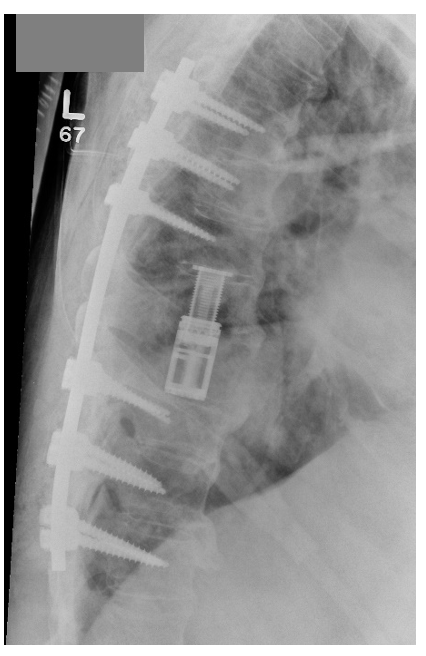
spinal cord compression

What is a spinal tumor?
Spine tumors are abnormal growths of tissues or cells in or around the spine. Like any other tumors that can be found throughout the body, they can either be cancerous (malignant) or non-cancerous (benign).
Commonly occurring non-cancerous (benign) tumors include:
- Osteoma
- Osteoblastoma
- Hemangioma
- Osteochondroma
While commonly occurring cancerous (malignant) tumors include:
- Chondrosarcoma
- Ewing’s sarcoma
- Lymphoma
- Osteosarcoma
- Multiple myeloma
Tumors that begin in the spine are called primary spinal tumors. Tumors that spread to the spine from other parts of the body (breast, prostate, lung, etc.) are referred to as secondary (or metastatic) spinal tumors.
What are the causes of spinal tumors?
While researchers do not yet know what causes most primary spinal tumors, they have found them to occur more commonly in those with certain genetic alterations. Secondary spinal tumors occur when cancer cells (from kidneys, lungs, breasts, and other parts of the body) spread to the spine.
Other causes include:
- Exposure to radiation
- Exposure to chemicals
- Genetics (for example, neurofibromatosis, a hereditary disease that can cause tumors in the spinal nerves)
What are the symptoms of spinal tumors?
Those who have a spine tumor can experience symptoms such as:
- Persistent and chronic back pain
- Numbness or loss of sensation
- Burning and tingling sensation
- Weakness of arms/legs
- Difficulty with balance
- Bladder or bowel control problems
The above symptoms may be associated with conditions other than spinal tumors. Evaluation by your physician is important if you develop these symptoms.
How are spinal tumors diagnosed?
A general and neurological examination can provide clues that are helpful for the diagnosis and localization of spinal tumors, but imaging and laboratory tests are commonly used to confirm the presence and location of spinal tumors. Some of these tests include:
- Cerebrospinal fluid (CSF) examination
- Blood tests for cell counts and markers
- Spine myelogram
- Spine computed tomography scan
- Spine magnetic resonance imaging scan
- Spine X-ray
In addition to these tests, bone scans and PET scans (which reveal the metabolic or biochemical function of tissues and organs) may be done to help medical professionals narrow down the location and extent of the tumor. If a tumor is found, a biopsy may be done to help identify the type of tumor and facilitate the necessary treatment.
How are spinal tumors treated?
There are numerous treatments available for spinal tumors and which ones are used depends on many factors including the severity of the tumor, its type, where it is located, and whether it is benign or malignant.
Medications such as corticosteroids and anti-inflammatory drugs may be prescribed to reduce inflammation and swelling around the spinal cord in some conditions. External braces are sometimes used to provide support and ease pain.
There are also treatments such as surgery, radiation therapy, chemotherapy, and physical therapy that may be indicated:
- Surgery: Goals of surgery typically include partial or complete removal of tumor and spinal stabilization if required. In addition, surgery allows sampling of tumor tissue for pathology and diagnosis.
- Radiation therapy: For some tumors, radiation may be indicated to help destroy any remaining cancer cells. Sometimes an advanced device called CyberKnife is used to provide painless and non-invasive treatment by passing high doses of radiation to targeted areas of the spinal.
- Chemotherapy: By using a combination of anti-cancer drugs, chemotherapy can help to shrink tumors, stop the tumor cells from increasing in number, and reduce their to surrounding and distant tissues. Drugs such as methotrexate, doxorubicin, cyclophosphamide, carboplatin, and ifosfamide, enter the bloodstream and reach the cancer cells to destroy them.
What are the complications of surgery and the various treatment options?
Complications can occur with any spinal surgery. Some of these include infection, need for blood transfusion, risk of nerve or spinal cord deficits such as new weakness or sensory loss, and risks of anesthesia. Since there are many different treatments available, specific risks of complications vary and should be discussed with your physician based on your specific condition and management plan.

